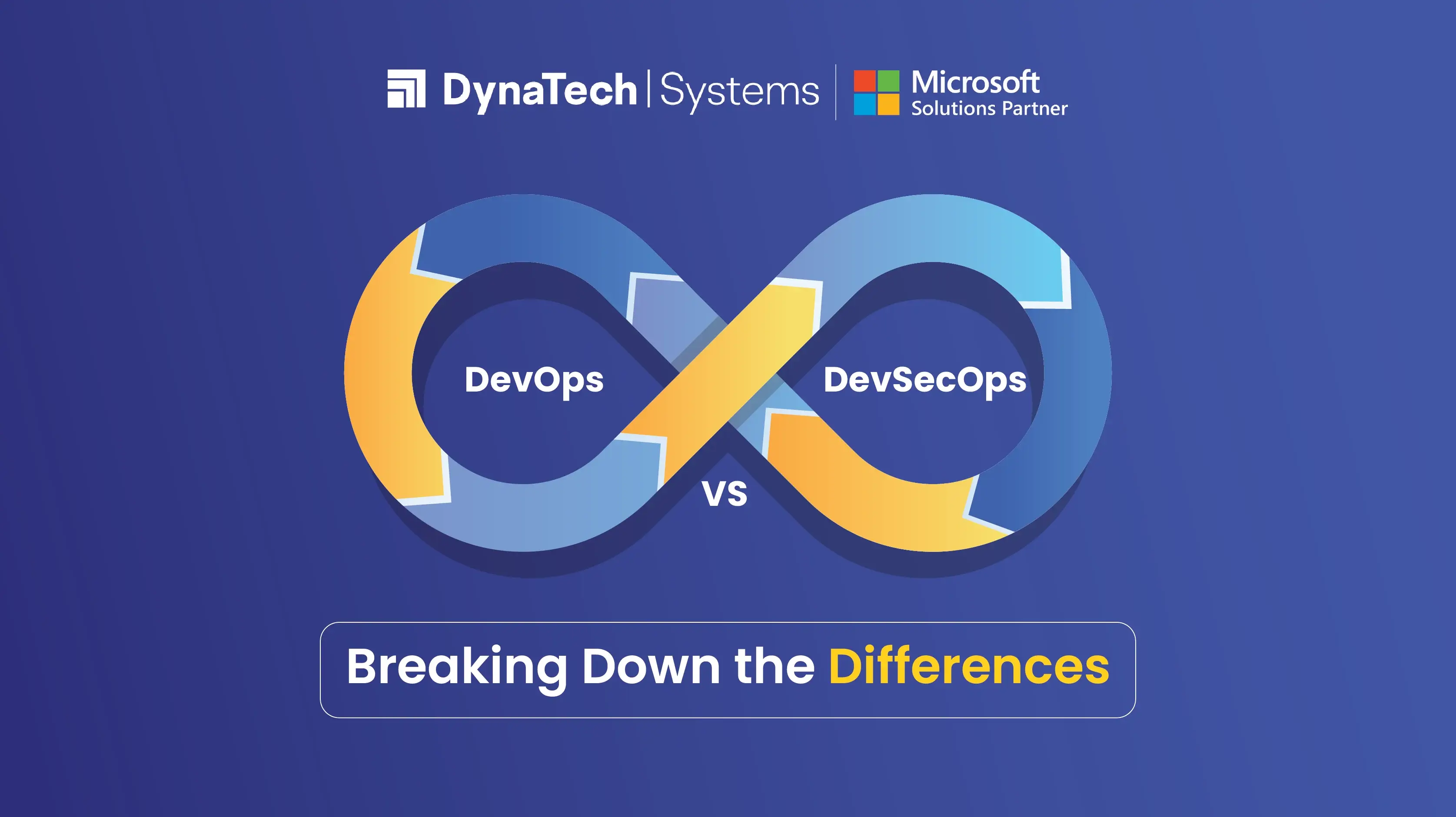Considering the rising software demands, businesses are adopting DevOps into their software development lifecycle (SDLC) at a staggering speed. It’s because traditional development practices cannot always suffice the security and scalability that is needed in prevailing software requirements.
Addressing every major challenge that is faced during software development, from quality to security, which causes delays in software delivery or launch, DevOps was launched.
Having said that, cybercrimes are advancing at a blazing pace, sometimes disrupting DevOps practices. Thus, to go one step further in security with emerging security solutions, the concept of DevSecOps was introduced.
However, the chaos related to the points of differences between DevOps and DevSecOps does not seem to end. Hence, we have created this article to help you understand the similarities and differences between DevOps and DevSecOps. So, when you choose DevOps consulting services, you choose it wisely for your business requirements. Let’s get started.
What is DevOps?
DevOps is a set of practices that merges software development (Dev) and IT operations (Ops) to elevate collaboration and productivity by automating and rationalizing the process of software delivery and infrastructure management. The key objective of DevOps is to accelerate the software development process, enhance deployment frequency, and boost the quality of software, which helps software development teams to fasten the launches without errors.
In addition, it also promotes seamless collaboration between cross-functional teams, continuous integration, continuous delivery (CI/CD), and the utilization of automation tools to enhance efficiency.
5 Key Use Cases of DevOps
Here are five prime use cases of DevOps. Let’s check out how DevOps optimizes the entire software development lifecycle for businesses:
1. Continuous Integration and Continuous Delivery (CI/CD)
With DevOps, it’s much easier for teams to automate the process of integrating code modifications, running tests, and deploying software for production. This ensures more rapid and reliable software deliveries or releases.
2. Infrastructure as a Code (IaC)
DevOps helps manage provisioning infrastructure with the help of code to automate setup, scaling, and configuration. This ensures consistency and minimizes the chances of manual errors.
3. Automated Testing and Monitoring
With DevOps integration in software development lifecycle management, running automated tests and continuous tracking of systems to detect bugs is much easier at the initial stage. This helps businesses improve system reliability, performance, and security.
4. Rapid Deployment and Rollbacks
DevOps enables faster deployments and the ability to roll back modifications if any problem occurs. This helps organizations maintain stability while delivering new features rapidly.
5. Collaboration Between Teams
DevOps allows operation, development, and other teams to collaborate seamlessly. This minimizes errors and silos and boosts efficiency in addressing and resolving key issues.
What is DevSecOps?
DevSecOps is an extension of DevOps that integrates robust security practices into the software development lifecycle from the initial stage of the development. Instead of considering security as a secondary thought or a separate phase altogether, DevSecOps makes sure that security is integrated across all the stages of the software development lifecycle, right from strategizing to coding, testing, and deployment. By embedding security tools, automated vulnerability assessment, and continuous monitoring into the DevOps pipeline, the core purpose of DevSecOps is to capture and address security vulnerabilities as soon as possible to minimize risks and ensure industry compliance for efficient software delivery.
5 Key Use Cases of DevSecOps
Here are five prime use cases of DevSecOps. Let’s check out how DevSecOps integrates security into the entire software development lifecycle for businesses:
1. Automated Security Testing
DevSecOps allows for the incorporation of automated security scanning and in-depth vulnerability assessment into the CI/CD pipeline to capture potential security issues in the initial phase of the development process and prevent them from exploiting the security of the software development lifecycle.
2. Shift-Left Security
DevSecOps practices helps organizations ensure that security is taken into consideration from the beginning of the software development lifecycle, with developers taking accountability for highly secured coding practices and security testing early on.
3. Compliance Automation
It helps automate compliance checks and security audits to ensure that software meets industry regulations and standards (e.g., GDPR, HIPAA) throughout the development and deployment phases.
4. Real-time Threat Detection
As DevSecOps encourages continuous monitoring of applications and infrastructure to prevent potential security threats from entering into systems. This enables teams to identify and resolve threat incidents in real-time.
5. Security Configuration Management
DevSecOps practices help businesses automate the security configuration of servers and environments to avoid misconfigurations that can potentially lead to vulnerabilities.
DevOps vs DevSecOps – Understanding the Similarities
Let’s check out what are the key similarities between DevOps and DevSecOps to understand both concepts to the core:
1. Collaboration and Communication
Both DevOps and DevSecOps promote collaboration between development, operations, and other departments. This notably reduces the chances for errors and silos to improve efficiency and problem-solving significantly.
2. Automation
The concept of both DevOps and DevSecOps primarily focus on automation in areas like testing, deployment, and infrastructure management to minimize manual effort, streamline consistency, and elevate the software delivery management.
3. Continuous Integration and Continuous Delivery (CI/CD)
DevOps and DevSecOps are majorly dependent on CI/CD pipelines to ensure continuous, automated integration and deployment of code. This encourages rapid and more trustworthy software releases.
4. Agile Principles
Both DevOps and DevSecOps are aligned with Agile methodologies, and their practices are based on iterative development, faster feedback, and continuous improvement to deliver value rapidly.
DevOps vs DevSecOps – The Key Points of Differences
Here’s a table highlighting the key differences between DevOps and DevSecOps:
|
Aspect |
DevOps |
DevSecOps |
|
Primary Focus |
DevOps focuses on speed, efficiency, and smooth collaboration in software delivery. |
DevSecOps prime focus is on security integration at every stage of development. |
|
Security Approach |
Here security is typically managed separately, generally post software development. |
Here security is integrated in the development process from the very beginning. |
|
Security Responsibility |
Developers and operations teams emphasize collaboration, with security often as a distinguishing concern. |
Security is everyone’s responsibility, with security teams integrated into the DevOps workflow. |
|
Tools and Automation |
DevOps practices include tools for CI/CD, configuration management, and infrastructure automation. |
DevSecOps practices include security tools (e.g., SAST, DAST) alongside DevOps tools for automated security testing and monitoring. |
|
Integration of Security |
Security may be added as a final step or post-deployment. |
Security is integrated continuously throughout the software development lifecycle. |
|
Compliance and Risk |
Compliance and risk management may be done manually or later in the process. |
Automated compliance checks and proactive risk management are integrated into the pipeline. |
|
Development Speed |
Focuses on delivering features quickly and efficiently. |
May have slightly slower delivery due to added security checks but improves long-term security and stability. |
Concluding Statement
We hope this article has helped you understand the points of differences and similarities between DevOps and DevSecOps. Giving this article a thorough review has definitely unlocked many potential advantages that will help you strategize your business, especially software development operations, in a better way. Still, if you need more technical assistance, you can surely reach out to enrich your business processes and drive excellence and growth to your business.




























